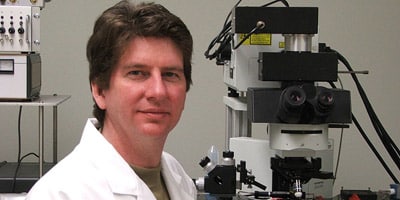For the first time in 2008, the CART Fund was able to make two grants in one year. From 56 outstanding applicants, our Scientific Review Committee chaired by Dr. John Trojanowski of the University of Pennsylvania, assisted by Dr. Allan Levey of Emory University and Dr. Karl Herrup of Rutgers University, recommended that our grants be made to Dr. Sanjay Pimplikar of the Cleveland Clinic ($250,000.00) and Dr. David Sweatt of UAB ($200,000.00).
Dr. Pimplikar’s research will explore the possibility that an emyloid percusor protein, called AICD, is the real culprit in causing Alzheimer’s disease. Up to now most scientists have focused on the A-beta part of the amyloid precursor but recent clinical trials targeting A-Beta have unfortunately failed. AICD has been shown to cause tau aggregation which is bad. Dr. Pimplikar states that his hopes are that in addition to confirming that AICD is the cause of AD, his research will screen for drugs that will prevent tau aggregation.
Most research to find the cause of Alxheimer’s disease, unfortunately, has failed. Dr. Pimplikar has shown in his early research that a protein referred to as AICD may be the cause of Alzheimer’s disease. This is an area that has been explored by few, if any other scientists. Dr. Pimplikar states that his hopes are that in addition to confirming that AICD is the cause of A.D. his research will screen for drugs that will prevent the effects of this protein. Recent developments indicate that Dr. Pimplikar’s research has great promise. In expressing his appreciation to CART and the Rotarians who make it possible, Dr. Pimplikar stated “CART funding is supporting novel and cutting edge research”.
Dr. Sweatt states that “CART funding will be critical for his laboratory to be able to aggressively pursue the development of a new drug that hopefully will lead to a new type of treatment for Alzheimer’s disease. His lab has discovered that long term memory formation involves changes in chemical and three dimensional structure of DNA. This discovery has allowed he and his colleagues to develop a new line of drug treatments that improve memory formation in laboratory animals. With the CART grant, Dr. Sweatt will be able to genetically test these findings.

